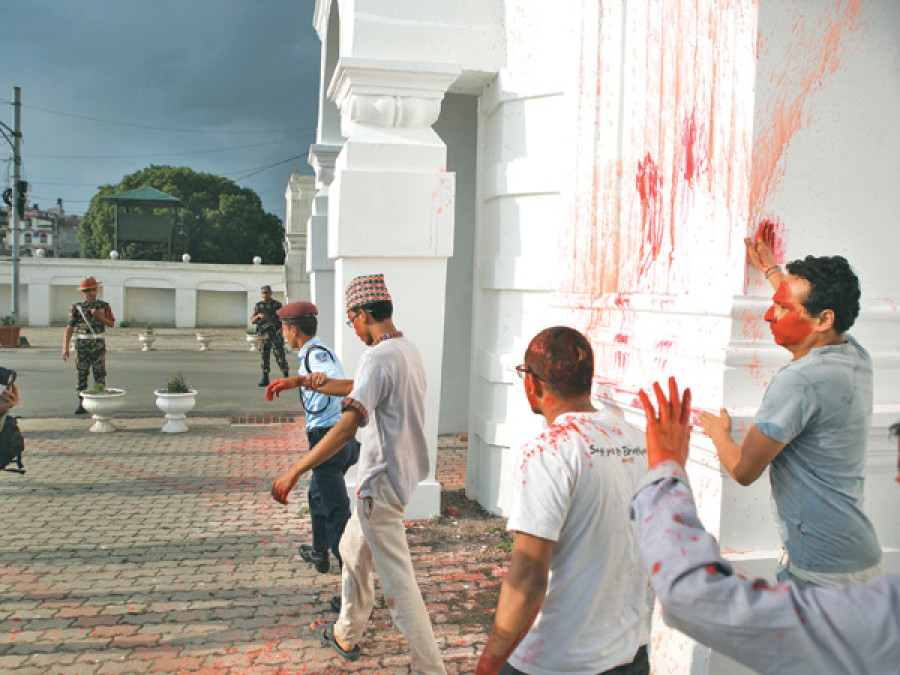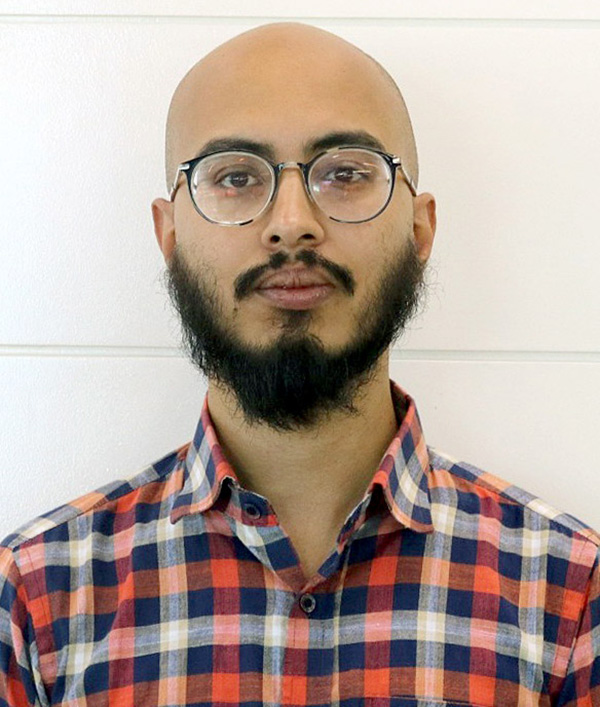Miscellaneous
As the means, so the ends
The young man who splashes paint on the walls of Singha Durbar is a hero to some and a criminal to others; he need not be either
Pranaya SJB Rana
A young man once walked up to the gates of Singha Durbar and painted them red. He was arrested and let go. But he did it again. Was arrested again. Others followed suit. More splashed paint as red as blood on Singha Durbar’s walls. They too were arrested. On social media, hashtags and support pages sprang up. One artist came up with a cartoon, another photoshopped all of Singha Durbar red.
The young man held beliefs. His was not a pointless act of vandalism. He said he wanted to expose the state’s “true nature”. The paint was the blood of innocents in the recent Madhes movement against the new constitution. The paint was years of oppression and structural violence. He admitted readily to the deed and said easily that he would do it again. He was willing to get arrested. So he did. And once arrested, he began a fast.
There is a history to this young man and it can be gleaned from social media, where young people have discovered a lost romance and idealism in his martyrdom. In the grand tradition of Mohandas Gandhi, Martin Luther King Jr, Irom Sharmilla, Nanda Prasad and Ganga Maya Adhikari and Govinda KC, this man rejects violence, choosing instead a satyagraha that involves defacing a government facade and a fast-unto-death. The paint can be washed off. The only lasting harm he might cause is to himself. But the hope is that he will prod others into action, although that hope comes heavy, given how Nanda Prasad passed.
In the days since, he has earned as many detractors as he has supporters. The most vocal of them call out his act of vandalism and decry that he dared offend the almighty institution of Singha Durbar. Even for those who curse politicians with each day with their itching Twitter fingers, the government suddenly became hallowed. There was talk of disrespect. Singha Durbar was inviolable. How dare he!
There are many who claim to understand his goals but disagree with his means. It’s too extreme, they say. It’s a crime, they say. They believe there is a better way and they have the luxury to believe this because they have very little at stake. They want to ‘reform’ the government, they want to ‘amend’ the constitution, they want order, they want false peace and a quiet war.
As with our moderate leftists, Martin Luther King Jr writes about the moderate white man in Letter from a Birmingham Jail:
“I have almost reached the regrettable conclusion that the Negro’s great stumbling block in his stride toward freedom is not the White Citizen’s Counciler or the Ku Klux Klanner, but the white moderate, who is more devoted to ‘order’ than to justice; who prefers a negative peace which is the absence of tension to a positive peace which is the presence of justice; who constantly says: ‘I agree with you in the goal you seek, but I cannot agree with your methods of direct action’; who paternalistically believes he can set the timetable for another man’s freedom; who lives by a mythical concept of time and who constantly advises the Negro to wait for a ‘more convenient season.’ Shallow understanding from people of good will is more frustrating than absolute misunderstanding from people of ill will. Lukewarm acceptance is much more bewildering than outright rejection.”
Civil disobedience, after all, is the wilful rejection of a law deemed unjust, or unnatural. A natural law, going by Antigone of Thebes, is that which is beholden to a higher order, that of justice. An unnatural law is one made by man and beholden only to he who pronounces the law. Such a law is followed out of fear, not out of faith. You uphold the law because you are afraid of the punishment, not because you believe it is just.
When the law is unjust, you can violate it, if you were to follow Gandhi. There will be repercussions, of course, and you must be ready for them. [As that young man is. He went to jail with a smile on his face.] What this course of action does is that it makes extremely loud and incredibly clear what was previously wilfully refused. That which society at large is willing to look past and discount for matters of convenience, civil disobedience makes inconvenient. For persons of conscience who have long learned to thrust their morals into the ground like heads in the sand, it becomes increasingly more difficult to continue to do so. The point might not be to ignite a revolution; it might instead be to spark an epiphany.
In open conflict, neither side comes away with its hands clean. But when one party refuses to fight, what is just tends to prevail, maybe not in the temporal sense but surely in the historical sense. This we must believe in. If justice is to be enacted, it must be for its own sake.
This young man’s actions speak to a kind of idealistic satyagraha, where it feels difficult to be pessimistic, although you know you have to. The state neither hears nor listens, except for the thumping of its own chest and beating of its own drums. The many innocents who have died are all swept under the flag.
Howard Zinn writes in Disobedience and Democracy, “...exactly at that moment when we have begun to suspect that law is congealed injustice, that the existing order hides an everyday violence against body and spirit, that our political structure is fossilized, and that the noise of change—however scary—may be necessary, a cry rises for ‘law and order.’ Such a moment becomes a crucial test of whether the society will sink back to a spurious safety or leap forward to its own freshening.”
We as a society are perhaps more polarised than ever before. Leftists demonising rightists and the right demonising the left. The label of progressive is claimed by all and sundry, no one wants to believe they are regressive. But underneath the patina of liberal social values lie a steadfast refusal to allow progressive politics, where uniformity and unfettered nationalism take the place of difference and inclusivity, where any criticism is seen as an attack, where xenophobia is masked by the rubric of self-reliance.
What this young man did is a symbolic act; it is clearly not his desire to destroy Singha Durbar. His politics is not radical. His methods are not extremist. In the statement he released himself, what he is asking seems quiet and unassuming, naive even. In these polarised times, he has become a hero to some and a criminal to others. But he doesn’t have to be either.
The young man has a name. It is Ishan. But he might as well be anyone.




 15.96°C Kathmandu
15.96°C Kathmandu










